
Excellent .....................****
Very Good .....................***
Good ...............................**
Fair ..................................*
Poor ...................... No Stars
Scroll down or click on the movie title to see its review:
Are We Done Yet? || Ice Cube Interview || Nia Long Interview
The Glamorous Life of Sachiko Hanai || Grindhouse
The Hoax || Jack Smith and the Destruction of Atlantis
The Lookout || Perfect Stranger || Halle Berry Interview
Rock the Bells || U-Carmen
Don't forget to check out the Denver Urban Connection
for your chance to win preview movie passes every month!
Are We Done Yet?
* 1/2
Slapstick Sequel Actually An Improvement
On The Original Formula
 Are We There Yet? (2005) was less a road comedy than a shameless, ninety-minute car commercial. Fortunately, the sequel doesn’t revolve around an automobile. In fact, nothing about this movie resembles the first, except for the presence of the same four principals in the cast. Are We There Yet? (2005) was less a road comedy than a shameless, ninety-minute car commercial. Fortunately, the sequel doesn’t revolve around an automobile. In fact, nothing about this movie resembles the first, except for the presence of the same four principals in the cast.
Ice Cube is back as Nick Persons, and he’s now married to Nia Long’s character, Suzanne, who is pregnant and expecting twins. He’s also adopted her two kids, Lindsey (Aleisha Allen) and Kevin (Philip Bolden), the two misbehaving little monsters who’d previously made his life miserable.
This time, though, Suzanne and the children are given little to do besides dropping their jaws in wide-eyed reaction shots. For this flick features Nick’s frustrations with their new country home and his strained relationship with Chuck (John C. McGinley), the slippery realtor who talked him into buying the fixer-upper secretly in need of wholesale renovations.
The reason the storyline has been totally overhauled is because it is actually a remake of Mr. Blandings Builds His Dream House (1948), a romp starring Cary Grant, Myrna Loy, Melvyn Douglas and Louise Beavers. And while Ice Cube’s acting has certainly improved with age, it is unfair to expect the affable gangsta’ rapper to measure up favorably to the charismatic Grant in terms of charm and screen chemistry.
That being said, this picture is stolen by Mr. McGinley, a perennial second banana who makes the most of an opportunity to upstage his relatively-wooden co-stars. He plays a jack-of-all-trades who, soon after selling the property to the Persons, returns not only as a contractor, but as the city inspector, a Lamaze counselor, an herbalist, a baby whisperer and a midwife.
It comes off looking as though director Steve Carr (Next Friday) decided to employ McGinley in a variety of roles either to save his studio some money or because he was well aware of the rubber-faced funnyman ability to make people laugh. Regardless, it proves to be a smart move, since the insufferable Chuck is the most entertaining aspect of the production.
As the film unfolds, we get a hint that these black folks might have a hard time adjusting to nature after living in the inner-city when Lindsey complains to her parents, “I can’t believe you’re making us move to the country. This is child abuse of the worst kind.” However, Nick is the only one who ends up overwhelmed by the relocation.
He is never allowed a peaceful moment, being disturbed by the revengeful raccoon who calls him “Sucker” and by equally-rude encounters with deer, sturgeon and a hawk. Still, it’s Chuck who most infuriates Nick, at least until he belatedly learns of the tragic loss which turned the once adoring husband into a crooked widower.
Stale and predictable, Are We Done Yet? is likely to be found hilarious only by tykes being exposed to plumber butt sight gags, fart jokes, anthropomorphic animal fare and construction site slapstick for the very first time. Otherwise, yeah, we’re done.
Rating: PG for sexual innuendo and mild epithets.
Running time: 92 minutes
Studio: Columbia Pictures
Return to Top
Cube With Attitude
The Are We Done Yet? Interview With Kam Williams
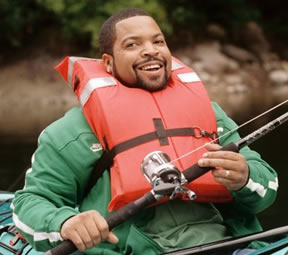 O’Shea Jackson, aka Ice Cube, was born in L.A. on June 15, 1969. The West Coast gangsta’ rapper found fame as a member of the group N.W.A. whose first album, “Straight Outta Compton,” featured the popular thug anthem “[Expletive] the Police.” Ice eventually branched out, embarking not only on his own phenomenal solo career, but also kick-starting the successful careers of many aspiring hip-hop artists as a producer and collaborator. O’Shea Jackson, aka Ice Cube, was born in L.A. on June 15, 1969. The West Coast gangsta’ rapper found fame as a member of the group N.W.A. whose first album, “Straight Outta Compton,” featured the popular thug anthem “[Expletive] the Police.” Ice eventually branched out, embarking not only on his own phenomenal solo career, but also kick-starting the successful careers of many aspiring hip-hop artists as a producer and collaborator.
He made his screen debut in Boyz N the Hood in 1991, following up that memorable performance with a score of hit flicks which included the Friday and Barbershop franchises, Anaconda, The Players Club, Three Kings, All About the Benjamins and XXX2. Here, Ice reflects on his latest flick, Are We Done Yet?, a comedy-of-errors sequel to Are We There Yet?. As Nick Persons, he is now married to Suzanne (Nia Long), the characters whose kids drove him crazy during the first installment.
KW: Does this sequel pick up right where the last movie left off?
IC: The Persons, we are a family now. We’re living in my small, cramped condo, and it’s time to get a bigger spot. That’s where all the problems come. That’s why the movie’s called Are We Done Yet?. Because we buy this nice house, and realize it’s a piece of junk. That’s where the story kind of takes off, and you get all the laughs that you got like the first one.
KW: This installment introduces a new character, Chuck [John C. McGinley]. What’s he like?
IC: It’s cool to have him like another dynamic. So, it’s not just me and the kids, but it’s me and this dude, Chuck, who keeps poppin’ into our lives. This is a small town, and he tries to wear every hat in town. So, he’s the realtor, and then when he comes back, he’s the carpenter. Everybody we need to fix the house, here he comes with that hat on. He’s just like a bolt of energy.
KW: How is Nick’s adjustment to life as a married man with an instant family?
IC: Everybody’s trying to get comfortable with each other. Nick, he’s going from being a bachelor, kinda’ living life like he wanted to, to being a family man. What I like about Nick is he doesn’t go from being cool to corny. He keeps his personality, and tries to fit it in with this family life which is what most people try to do. So, I think most people can identify with him, especially adults who are familiar with this situation.
KW: How did you like being directed by Steve Carr again?
IC: Steve had the potential and the energy and the vision to be a great director. We gave him his first shot on Next Friday. It was cool to come back after he had some big movies under his belt (Dr. Dolittle 2, Rebound, Daddy Day Care), and work with him, and see that he knows what he wants. It’s just been one of the easy and most laidback projects that I’ve worked on, because I know Steve’s going to be there, he’s going to be cool. Steve never has an attitude. He’s always ready to go. And I can’t wait to work with him again.
Return to Top
Nia’s Knocked Up Again
The Are We Done Yet? Interview With Kam Williams
 Who ever heard of an actress being typecast as pregnant? That’s exactly what appears to be happening to Nia Long lately. In 2004, the talented thespian of Trinidadian extraction appeared in Alfie, where she played the playboy’s knocked-up ex-girlfriend, Lonnette. Who ever heard of an actress being typecast as pregnant? That’s exactly what appears to be happening to Nia Long lately. In 2004, the talented thespian of Trinidadian extraction appeared in Alfie, where she played the playboy’s knocked-up ex-girlfriend, Lonnette.
Then, last year, we found her expecting again in her very next movie, Big Momma’s House 2, where she was reprising the role of Sherri opposite Martin Lawrence. Nia seems to be stuck on the mommy track, because, now, as Suzanne in Are We Done Yet?, she’s about to give birth to twins. Here, the fetching beauty, who was named one of the World’s 50 Most Beautiful People by People magazine in 2000, talks about this latest outing opposite Ice Cube.
KW: How would summarize the storyline of this sequel to Are We There Yet?
NL: What happens is: Nick decides to sell the sports bar to start his magazine. And when the family finds out I’m having twins, we’re like, “Oh my God! We’re gonna need more space.” So, we move outside of the city to get more for your money, and we find this beautiful, old home that needs a little work. But then, once we move in, we realize that it’s falling apart at the seams.
KW: Besides being pregnant, how is your character different?
NL: In the last film, you saw her, she was troubled. She was going through a divorce… her ex-husband was playing games… It was “Where are my kids? Where are my kids? Where are my kids?” In this one, you see her as sort of this resolved woman who’s like, “Okay, I’m pregnant, I’m married, I’m not working, I’m a stay-at-home mom, and this is my new life.” And so, with that, you see a lighter part of her personality. She’s much more optimistic about things. She wants everything to be great, but she’ll still tell you like it is. She’s not a fool.
KW: So now, we have Chuck [John C. McGinley] playing the heavy.
NL: I didn’t really know what to expect in terms of how he was going to play the character. I love that he’s just completely over the top. But the thing is he’s so consistent with it, that it works. ‘Cause there just are people like him in the world. So, it’s good.
KW: This means your character has a lot less drama this time around.
NL: See, that’s the thing. Suzanne, she’s always conveniently gone, because she’s pregnant. I’m not getting out on a ledge with a raccoon. “Honey, be careful, and let me know where you left the money. So, if anything happens to you, I know where to go.” [Laughs]
Return to Top
The Glamorous Life of Sachiko Hanai
*** 1/2
Hooker Morphs Into Savant
In Sophisticated Sci-Fi Skin Flick
 Sachiko Hanai (Emi Kuroda) is a kinky call girl at a Tokyo imekura, a brothel which caters to customers with a fetish for teacher-student role play. However, the happy hooker’s life is irreversible altered, by chance, the day she accidentally stumbles upon a rendezvous gone bad between North Korean and Arab secret agents which turns into a shootout. Sachiko Hanai (Emi Kuroda) is a kinky call girl at a Tokyo imekura, a brothel which caters to customers with a fetish for teacher-student role play. However, the happy hooker’s life is irreversible altered, by chance, the day she accidentally stumbles upon a rendezvous gone bad between North Korean and Arab secret agents which turns into a shootout.
After taking a stray bullet to the forehead, Sachiko doesn’t die but is somehow magically transformed into a savant capable of solving complex mathematical formulas, speaking several foreign languages, and conversing about the works of great thinkers from Noam Chomsky to Susan Sontag. In fact, the lustful geisha girl soon discovers that she even climaxes when discussing such sophisticated fare with her favorite clients.
More importantly, however, Sachiko has somehow ended-up in possession of the fingerprint of George Bush, which makes her capable of kickstarting a nuclear Armageddon. With spies in hot pursuit, and the future of mankind in her horny hands, the question becomes, “How will this sudden genius handle her awesome responsibility?”
This is the clever-enough premise upon which The Glamorous Life of Sachiko Hanai rests. The film is the latest in a new genre of fairly sexually-explicit flicks, ala the equally-shocking Shortbus and Exterminating Angels. While there was a time when these movies would have been summarily dismissed as soft pornography, it appears that more and more of them are making their way into legit theaters willing to exhibit features with fairly graphic depictions of human sexuality.
Perhaps this is a sign that Puritanical Hollywood might be moving away from its violence-oriented ratings system which would censor a scene of a man caressing a woman’s bosom, but not one where he simply shot or stabbed her in the chest. While its title makes no sense, The Glamorous Life of Sachiko Hanai is an imaginative erotic adventure mixes a discussion of dialectical materialism, Latin phrases like “Deus ex Machina” and “Cogito Ergo Sum,” and the famous file footage of the toppling of the statue of Saddam Hussein in with some rather raunchy behavior of George Bush that will really generate a little shock and awe.
Is this sleaze dressed up as art, or vice-versa? As more and more daring directors opt to push the envelope with similar conversation-provoking pictures, we’ll have to let the debate about what could be an emerging cinematic trend continue.
Rating: Unrated
In Japanese with subtitles
Running time: 90 minutes
Studio: Palm Pictures
Return to Top
Grindhouse
****
Horror Double-Feature For Fans
Of B-Flicks From The Fifties
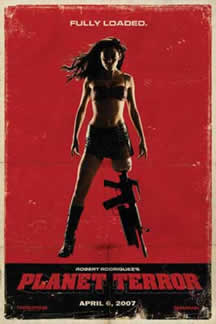 Grindhouse is a relatively recently-coined word which refers, albeit retroactively, to a type of theater which exclusively screened low-grade B-movies. The term is ostensibly derived from the phrase “bump and grind” because these establishmentshad generally previously hosted burlesque shows. Grindhouse is a relatively recently-coined word which refers, albeit retroactively, to a type of theater which exclusively screened low-grade B-movies. The term is ostensibly derived from the phrase “bump and grind” because these establishmentshad generally previously hosted burlesque shows.
In their cinematic heyday, the trashy grindhouses catered to a clientele with an appetite for any of a variety of sensational, shocking or salacious fare, ranging from the sexploit to the screamer to the shockumentary to the chopsocky to the Blaxsploit to the splatter genres. Now filmgoers somehow nostalgic for thatbrand of mediocre moviemaking can be magicallytransported back to theFifties era via Grindhouse,a double featurefrom Robert Rodriguez (Sin City) and Oscar-winner Quentin Tarantino (for Pulp Fiction).
What we have here are a couple of hilarious, high attrition-ratehorror parodies augmented by a few faux ads for upcoming slasher adventures with titles like “Machete,” “Thanksgiving,” “Don’t” and “Werewolf Women of the S.S.” The fun begins with Planet Terror, Rodriguez’s gruesome homage to every awful zombie adventure ever made, followed by Tarantino’s Death Proof, which revolves around a psychopathic stuntman (Kurt Russell) with a muscle car and murder on his mind.
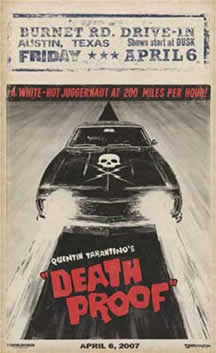 Be forewarned, in order to recreate an authentic B-movie aura, both directors have gone out of their way to degrade the quality of their productions. So, don’t be surprised to see deliberately choppy editing, seasick cinematography, obviously excised scenes, cheesy dialogue, unrelated filler sequences and low-budget special effects, along with obvious scratch marks etched into the screen to convey the idea that you’re watching a well-worn print. Be forewarned, in order to recreate an authentic B-movie aura, both directors have gone out of their way to degrade the quality of their productions. So, don’t be surprised to see deliberately choppy editing, seasick cinematography, obviously excised scenes, cheesy dialogue, unrelated filler sequences and low-budget special effects, along with obvious scratch marks etched into the screen to convey the idea that you’re watching a well-worn print.
Planet Terror, which resurrects the familiar flesh-eating zombie theme, stars Rose McGowan as Cherry Dancer, a stripper who once dreamed of becoming a doctor but now hopes to become a stand-up comedienne. The inconsequential plot thickens when, ala Night of the Living Dead, the deceased come back to life in order to feast on fellow humans. However, after losing a leg to the ghouls, Cherry gets her chance to save the day in a bloody finale when she has an automatic weapon mounted onto her stump.
Tarantino’s Death Proof ultimately proves to be another female empowerment tale, as a trio of two-fisted cuties (Rosario Dawson, Zoe Bell and Tracie Thoms) decide to turn the tables on their maniacal tormentor. While this flick fails to measure up to the first either in terms of intensity or overall entertainment value, who could possibly complain when you’re getting two films for the price of one?
Expertly executed by a talented ensemble which includes Josh Brolin, Freddy Rodriguez, Nicky Katt, Sydney Poitier (Sidney’s daughter) and Tarantino, himself, plus cameos by Nicolas Cage and Bruce Willis, Grindhouse is a guaranteed treat for fans of those forgettable B-flicks of the Fifties.
Rating: R for nudity, sexuality, pervasive profanity, ethnic slurs, drug use, graphic violence, and gratuitous gore.
Running time: 191 minutes
Studio: The Weinstein Company
Return to Top
The Hoax
****
Character-Driven Drama Recounts Hubris Of
Bogus Howard Hughes Biographer
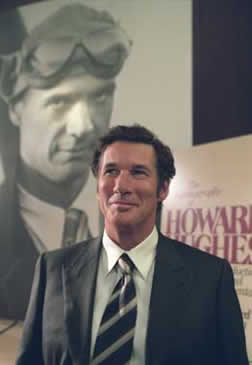 Clifford Irving (Richard Gere) was a virtually-unknown writer who had previously published a half-dozen underappreciated novels when, in 1970, he decided to pass off his next work of fiction as an authorized memoir of one of the most famous people on the face of the Earth. Because Howard Hughes (Milton Buras) had not spoken to the press in over 15 years, Irving was banking on the idea that the reclusive billionaire would not even break his self-imposed silence to denounce the book as a complete fraud. Clifford Irving (Richard Gere) was a virtually-unknown writer who had previously published a half-dozen underappreciated novels when, in 1970, he decided to pass off his next work of fiction as an authorized memoir of one of the most famous people on the face of the Earth. Because Howard Hughes (Milton Buras) had not spoken to the press in over 15 years, Irving was banking on the idea that the reclusive billionaire would not even break his self-imposed silence to denounce the book as a complete fraud.
So, collaborating with Richard Suskind (Alfred Molina), another struggling author with felonious intent, Irving duped McGraw-Hill into believing that the eccentric hermit had actually cooperated in the creation of the bogus biography. The book company coughed up close to a million-dollar advance, with the bulk of the money coming in a check made out to “H. R. Hughes.” That was cashed in Switzerland by Irving’s fourth wife, Edith (Marci Gay Harden), who simply endorsed it with the sobriquet “Helga R. Hughes.”
Still, since nagging suspicions about the manuscript continued to haunt the project right from the start, the brazen con men found themselves having to rely on an increasingly elaborate ruse to silence the skeptics. And the pair might have managed to pull it all off, had Hughes himself not finally decided to collapse their house of cards by making his first public appearance in ages to expose them as charlatans.
Now the entire scheme has been revisited by The Hoax, an intriguing, character-driven drama directed by three-time Oscar-nominee Lasse Hallstrom. Curiously, the gifted Swedish director decided to adapt his film from the self-serving confession of the same name published by Irving back in 1972. Consequently, the disgraced ex-con is depicted somewhat sympathetically, less as an inveterate liar and shameless womanizer than as a cagy prankster and carefree bon vivant who stole to be able to afford the finer things in life, ala the similarly self-indulgent protagonist of Catch Me If You Can.
Richard Gere is at his best in years, here, turning a remorseless lout into an almost likable underdog. Meanwhile Alfred Molina is equally-effective in his capacity as Irving’s clumsy, conflicted co-conspirator. Also of note are Oscar-winner Marcia Gay Harden (for Pollock) who virtually disappears into her role as Irving’s humiliated spouse; Julie Delpy as his socialite mistress, Nina Van Pallandt; Hope Davis as his exasperated agent, Andrea Tate; Stanley Tucci as irascible McGraw-Hill executive, Shelton Fisher; and Eli Wallach as former Hughes confidante, Noah Dietrich. Hallstrom must be credited for coaxing so many quality measured performances out of another top-flight cast, a trademark feat which in the past resulted in Oscar nominations for Juliette Binoche (Chocolat), Judy Dench (Chocolat), Michael Caine (The Cider House Rules) and Leonardo DiCaprio (What’s Eating Gilbert Grape).
Though worthwhile for its capably-executed, beguiling plot alone, The Hoax also earns high marks for the painstaking effort the production made to recreate the ambience of the early Seventies, thereby magically transporting the audience back to that bygone era. Still, make no mistake, it is Irving who gets the last laugh, after all is said and done, by resurrecting his image courtesy of this empathetic bio-pic.
Rated R for profanity.
Running time: 115 minutes
Studio: Miramax Films
Return to Top
Jack Smith And The Destruction Of Atlantis
****
Bio-Pic Revisits Cinematic Career Of Unrecognized Genius
 Jack Smith (1932-1989) was an uncompromisingly experimental innovator in the field of cinema, whose name might not be known to the general public despite the fact that he has been credited as an influence by such fellow avant garde filmmakers as Federico Fellini, Jean-Luc Godard, Jim Jarmusch, Andy Warhol and John Waters. This unrecognized genius is finally receiving a measure of respect, even if belatedly, with the release of Jack Smith and the Destruction of Atlantis, a bio-pic which mixes snippets of his flicks in with the reflections of colleagues, actors and friends who were fond of him and his work. Jack Smith (1932-1989) was an uncompromisingly experimental innovator in the field of cinema, whose name might not be known to the general public despite the fact that he has been credited as an influence by such fellow avant garde filmmakers as Federico Fellini, Jean-Luc Godard, Jim Jarmusch, Andy Warhol and John Waters. This unrecognized genius is finally receiving a measure of respect, even if belatedly, with the release of Jack Smith and the Destruction of Atlantis, a bio-pic which mixes snippets of his flicks in with the reflections of colleagues, actors and friends who were fond of him and his work.
We learn that Smith was born in Columbus, Ohio where he had a very unhappy childhood, perhaps due to his being gay in the breadbasket of America. As a young adult, he made his way to New York’s Greenwich Village where he embarked on a career in the fields of photography, performance art, and film.
There, this irreverent iconoclast made daring movies deemed pornographic in their day, such as Shocking Creatures, which was banned in 22 states. Watching some of his censured scenes now, it is apparent that times have certainly changed. Yes there’s plenty of male and female nudity, especially homoerotica featuring flamboyant drag queens, but nothing hardcore that would warrant the implementation of drastic legal sanctions.
In fact, the most alarming aspect of the production might not be any of the images, but the intermittent voiceover of Jack Smith. In a rambling rasp, he can be heard railing against the mercenary nature of capitalism and bitterly raising a litany of other complaints about the state of American society.
Alternately bizarre and inspired, but an appropriate tribute to a visionary impossible to pigeonhole.
Rating: Unrated
Running time: 94 minutes
Studio: Tongue Press/Film Forum
Return to Top
The Lookout
****
Brain-Damaged Bank Janitor
Enlisted As Gang’s Accomplice
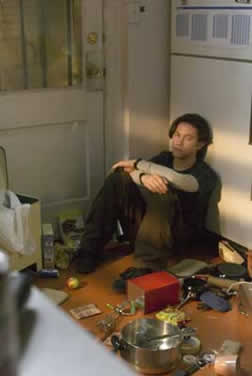 Chris Pratt (Joseph Gordon-Levitt) was once on top of the world. The son of a tycoon in his hometown of Kansas City, this boy-most-likely was a star on his high school hockey team, drove a cool convertible, and was adored by his devoted girlfriend, Kelly (Laura Vandervoort). Chris Pratt (Joseph Gordon-Levitt) was once on top of the world. The son of a tycoon in his hometown of Kansas City, this boy-most-likely was a star on his high school hockey team, drove a cool convertible, and was adored by his devoted girlfriend, Kelly (Laura Vandervoort).
Unfortunately, Chris also suffered from that uniquely teen delusion of invincibility, which led him to tempt fate one night by speeding down a country road with his headlights turned off. That impulsive decision to show off behind the wheel changed his life in an instant when his car plowed into a stalled farm combine.
Two of his close friends died in the crash. Kelly survived, but lost a leg and never spoke to him again. And Chris suffered a severe head trauma which left him with crippling brain damage.
It is now four years since the accident and he is still in rehabilitation trying to relearn the ability to master simple motor tasks everybody takes for granted. Because he suffers from short-term memory loss, he must write copious notes to himself as reminders of what needs to be done.
With his career prospects severely limited by this mental incapacity, Chris considers himself lucky to be employed as a night janitor at the Noel State Bank & Trust. He shares a modest apartment on the seedy side of the city with Lewis (Jeff Daniels) a blind optimist with a pipe dream of opening a diner named, “Lew’s Your Lunch.”
This tragic tableau sets the table for The Lookout, a crime caper ostensibly-inspired by Memento (2000), another whodunit revolving around a hero afflicted with amnesia. The movie was written and directed by Oscar-nominee Scott Frank (for the script of Out of Sight), who might have borrowed heavily from Memento but successfully overhauled it into a psychological thriller capable of standing on its own.
The plot thickens the day Chris is befriended by Gary Spargo (Matthew Goode), a shady character claiming to be an acquaintance of his sister, Alison (Janaya Stephens). The truth is that the stranger is a member of a ruthless gang out to enlist his assistance to rob the bank where he works. Because of his brain disorder, Chris is gullible and easy pickings for a crafty crook like Gary.
Just as in Memento, the protagonist proves to be quite confused about his new pal’s motivations, especially since the guy’s got girls, including the irresistible and lovely Luvlee (Isla Fisher). Fortunately, despite his deficiencies, Chris never lost his moral core, a trait which usually enables any underdog to trump pure evil, at least at the movies.
Not nearly as much of a mind-bender as Memento, yet The Lookout is, nonetheless, a praiseworthy homage to that inscrutable brain teaser.
Rating: R for sex, expletives and violence.
Running time: 99 minutes
Studio: Miramax Films
Return to Top
Perfect Stranger
No Stars
Reporter Goes Undercover To Crack Murder Case
In Convoluted Crime Yawner
 Until she quit her job, Rowena Price (Halle Berry) was an investigative journalist at the New York Courier. But she left the daily newspaper to preserve her integrity right after her boss (Richard Portnow) decided to kill a shocking story she was about to break about Senator Sachs (Gordon MacDonald), a “family values“ Republican she’d caught in a compromising position with a male intern. Until she quit her job, Rowena Price (Halle Berry) was an investigative journalist at the New York Courier. But she left the daily newspaper to preserve her integrity right after her boss (Richard Portnow) decided to kill a shocking story she was about to break about Senator Sachs (Gordon MacDonald), a “family values“ Republican she’d caught in a compromising position with a male intern.
The intrepid reporter’s retirement to her spacious, Christopher St. apartment in trendy Greenwich Village turns out to be short-lived, since she’s soon summoned to the morgue to help identify the body of her a murder victim. And when Rowena rushes from the refrigerated room to regurgitate, we know that corpse is, indeed, that of Grace Clayton (Nicki Aycox), her best friend since childhood.
The two had grown up as next-door neighbors and remained close until recently, when their relationship become strained after Grace slept with Rowena’s on-again/off-again boyfriend, Cameron (Gary Dourdan). Posthumously, their life-ling bond proves stronger than any beau, because Rowena opts to investigate the grisly killing without even involving the police.
Instead, she enlists the assistance of Miles (Giovanni Ribisi) in this endeavor, a computer whiz who can barely hide the secret crush he has on his brainy and beautiful colleague. The two quickly discern that Grace was having an affair with Harrison Hill (Bruce Willis), a married advertising tycoon with a wandering eye and a very jealous spouse, Mia (Paula Miranda). Due to her hubby’s history of infidelity, Mia handpicked his assistant, Josie (Daniella Van Graas), a lipstick lesbian she thinks she can count on to shadow his every move at the office for her.
Certain that the solution to the mystery is hidden somewhere inside the Hill empire, Rowena adopts an alias and takes some temp work at the ad agency. Her plan is to seduce the weak-willed CEO into making an incriminating admission by sending him flirtatious instant messages from the other side of the office.
If only the balance of Perfect Stranger measured up to this promising premise, but unfortunately, the picture falls apart soon after this captivating point of departure. Not even the squandered screen chemistry or considerable star power of Halle Berry and Bruce Willis could save a flick relying on a script so infuriatingly convoluted and patently unfair to its audience.
The essential problem is that the over-plotted production introduces too many characters, especially given that virtually every one of them might be a suspect. Laced with an abundance of rather obvious red herrings, the twists and turns actually could have been laughable, had the picture been pre-packaged as a deliberately mediocre, tongue-in-cheek homage to bad detective flicks of a bygone era.
However, this pretentious whodunit plays it straight, and ends up indistinguishable from any of those formulaic, made-for-TV crime dramas you’d channel-surf past without a second thought. Since it would still be unfair to share the jaw-dropping resolution of this rabbit-out-of-the-hat head-scratcher, just be forewarned that that the film offers next to no clues as to what’s coming except when hastily divulged during the denouement almost as an afterthought.
A perfect stinker.
Rating: R for profanity, nudity, sexuality, and disturbing violent images.
Running time: 109 minutes
Studio: Revolution Studios
Return to Top
Perfect Halle
The Perfect Stranger Interview With Kam Williams
 Halle Berry is no stranger to the psychological thriller, having once played a shrink-turned-amnesiac mental patient in Gothika (2003). With Perfect Stranger, the Oscar, Emmy and Golden Globe-winner revisits the genre as an investigative journalist who adopts a fake identity in order to solve her best friend’s murder. Here she talks about this latest picture, a multi-layered mystery which co-stars Bruce Willis as the prime suspect and Giovanni Ribisi as the colleague/sidekick who has a secret crush on her. Halle Berry is no stranger to the psychological thriller, having once played a shrink-turned-amnesiac mental patient in Gothika (2003). With Perfect Stranger, the Oscar, Emmy and Golden Globe-winner revisits the genre as an investigative journalist who adopts a fake identity in order to solve her best friend’s murder. Here she talks about this latest picture, a multi-layered mystery which co-stars Bruce Willis as the prime suspect and Giovanni Ribisi as the colleague/sidekick who has a secret crush on her.
KW: How would you describe Perfect Stranger?
HB: There are dangers everywhere. In the beginning of the movie, a murder occurs. And somebody did it. Somebody among us. Somebody that you see on screen in this movie committed a murder. So, there’s danger everywhere you look, and you don’t know who did it, and so you don’t know if they’ll strike again. You don’t know when they’ll strike again. You don’t know who’s going to solve it, or even if it’s going to be solved. So, there’s an element of mystery and danger from beginning to end, I think till the very last scene of the movie, also pretty shocking. There are some moments we filmed that are pretty shocking. I read them on the pages one way, but we filmed them in a way that was surprisingly shocking to even those of us involved. You never know what’s going to happen when you turn the camera on, sometimes.
KW: What was it like acting opposite Bruce Willis?
HB: He was really, really wonderful in this movie. He’s perfectly cast [as advertising tycoon Harrison Hill]. He had a real handle on who this guy was and what motivated him. He’s wonderful in the movie.
KW: How about your other co-star, Giovanni Ribisi?
HB: Giovanni’s very cerebral, and he’s very talented. He’s the kind of actor that wants to dig deeper and deeper and deeper and deeper and understand layer after layer. I really respect that about him. He’s always thinking about the character and trying to make the connections more real, not only for himself. And in doing that he makes it real for those around him, too.
KW: Every character seems to be hiding a big secret here, so would you say that the movie is delivering some sort of message about secrecy?
HB: It’s staggering what someone will do, or can do. I think this movie sort of highlights that. And the characters are sort of intertwined, and they intersect in a way which makes them all very much alike, but at the same time very different. But they all have secrets. They’re all hiding something. They’re all pretending to be not exactly who they are all the time, and that makes them all connected in a weird way, and makes them kind of the same in a weird way.
Return to Top
Rock The Bells
***
Hip-Hop Documentary Chronicles Wu-Tang Clan’s
Swan Song At 2004 Concert
 Fans of the rap game know that the Wu-Tang Clan was comprised of nine gangstas with menacing monikers like Masta Killah, Ghostface Killah, Ol’ Dirty Bastard (aka ODB), GZA, Inspectah Deck, Method Man, Raekwon the Chef, RZA and U-God. Devotees of the group are probably likewise familiar with the Clan’s reputation as notorious no-shows. Fans of the rap game know that the Wu-Tang Clan was comprised of nine gangstas with menacing monikers like Masta Killah, Ghostface Killah, Ol’ Dirty Bastard (aka ODB), GZA, Inspectah Deck, Method Man, Raekwon the Chef, RZA and U-God. Devotees of the group are probably likewise familiar with the Clan’s reputation as notorious no-shows.
It is for this reason, I suppose, that Rock the Bells might find an audience among those committed to the so-called thug life. For the movie is more about the efforts of music entrepreneur Chang Weisberg simply to reunite the naughty nonet for what would be its final concert in San Bernardino, California during the summer of 2004.
Shot just four months before the late ODB would OD on cocaine that November, most of the film is devoted to the day-long rap festival’s frantic promoter, a whirling dervish who attends to virtually aspect of the show with the help of a skeleton crew. Besides the Clan, eight other acts were scheduled to appear, including Redman, who emerges from his limo issuing an urgent mandate for marijuana, ordering, “Find some herb! Now! And I ain’t kidding!”
As amusing as that might be, some of the lesser-known performers still steal the show, like this pudgy, college-bred white rapper who boasts about the size of his manhood on stage before proceeding to take his pants off to wave it at the less than appreciative females in attendance. This rhyming exhibitionist turns out to be a rather good sport despite being pelted with garbage incessantly during his entire performance. At one point, he drapes himself with an American flag, hoping that the audience might end the barrage out of respect for Old Glory, but to no avail.
As if hip-hop’s answer to Woodstock, the gathering gets uglier as it unfolds, and again and again it invariably falls to the ethnically-ambiguous Chang, conveniently ever on camera, to deal with each crisis, whether with cops concerned about contraband, artists upset about the crappy sound system, the often impatient and unruly patrons, or his overwhelmed employees. Though also featuring Redman, Dilated Peoples, MC Supernatural, Sage Francis, Eyedea & Abilities, Chalie 2na, and DJ Numark, the picture proves to be a fitting posthumous tribute to ODB and the Wu-Tang Clan, given their chosen genre’s mandate to keep it real.
Rating: R for nudity, sexuality, pervasive profanity, ethnic slurs, drug use, graphic violence, and gratuitous gore.
Running time: 191 minutes
Studio: Seventh Art Releasing
Return to Top
U-Carmen
****
Bizet’s Classic Opera Reinterpreted As
South African Musical Melodrama
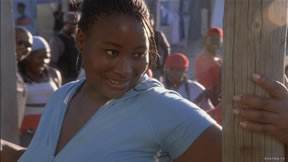 Georges Bizet introduced Carmen to the stage in Paris on March 3, 1875. At the time, the daring, four-act musical melodrama was roundly panned by the critics, but what do they know? Its popularity has endured to the present, nonetheless, and it remains one of the most frequently performed operas. Little good this belated success did for its composer, as the bitterly-disappointed Mr. Bizet dropped dead of a heart attack less than three months after the show opened, on his wedding anniversary, at the tender age of 36. Georges Bizet introduced Carmen to the stage in Paris on March 3, 1875. At the time, the daring, four-act musical melodrama was roundly panned by the critics, but what do they know? Its popularity has endured to the present, nonetheless, and it remains one of the most frequently performed operas. Little good this belated success did for its composer, as the bitterly-disappointed Mr. Bizet dropped dead of a heart attack less than three months after the show opened, on his wedding anniversary, at the tender age of 36.
Hollywood has enjoyed a long love affair with Carmen which began soon after the arrival of moving pictures, starting in 1915 when Cecil B. DeMille released it as a silent flick. A remake arrived less than three years later, the first of a never-ending string of screen revivals of the enduring classic.
A noteworthy adaptation was Oscar Hammerstein’s Carmen Jones, which featured Dorothy Dandridge’s Oscar-nominated performance in the titular role. Another was The Wild, Wild Rose (1960), starring Grace Chang, and sung in Mandarin Chinese. Later, celebrated tenor Placido Domingo would play Don Jose in the 1984 version.
More recently, bootylicious Beyonce’ took a turn as the irresistible heroine in MTV’s Carmen: A Hip Hopera (2001), an unrecognizable overhaul of the original production into a ghetto fabulous fantasy. Now, from South Africa, we have U-Carmen, a fairly faithful interpretation of the source material, except for the fact that the songs are sung in native Xhosa instead of French.
Voluptuous Pauline Malefane more than holds her own vocally while strutting her stuff as the ill-fated, femme fatale at the center of the familiar tragedy. And the rest of the company asked to execute this tragic tale of love and betrayal is equally impressive. Audaciously set on a variety of visually-engaging, bare-bones locales ostensibly picked without concern for cinematic pretense, U-Carmen effectively conveys a sense of everyday life in the region’s Khayelistha Township while simultaneously serving up an endearing variation of a magical opera for the ages. Bravo!
Rating: Unrated
In Xhosa with subtitles.
Running time: 121 minutes
Studio: Koch Lorber Film
Return to Top |
